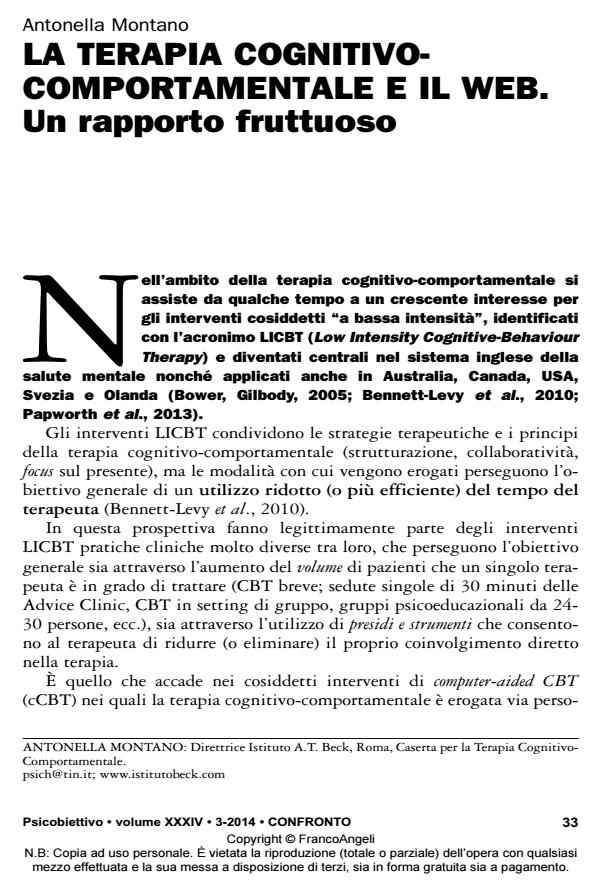La terapia cognitivo-comportamentale e il web. Un rapporto fruttuoso
Titolo Rivista PSICOBIETTIVO
Autori/Curatori Antonella Montano
Anno di pubblicazione 2015 Fascicolo 2014/3
Lingua Italiano Numero pagine 18 P. 33-50 Dimensione file 124 KB
DOI 10.3280/PSOB2014-003003
Il DOI è il codice a barre della proprietà intellettuale: per saperne di più
clicca qui
Qui sotto puoi vedere in anteprima la prima pagina di questo articolo.
Se questo articolo ti interessa, lo puoi acquistare (e scaricare in formato pdf) seguendo le facili indicazioni per acquistare il download credit. Acquista Download Credits per scaricare questo Articolo in formato PDF

FrancoAngeli è membro della Publishers International Linking Association, Inc (PILA), associazione indipendente e non profit per facilitare (attraverso i servizi tecnologici implementati da CrossRef.org) l’accesso degli studiosi ai contenuti digitali nelle pubblicazioni professionali e scientifiche.
A partire dal paradigma della terapia cognitivo-comportamentale "a bassa intensità", l’autrice fa una panoramica dei protocolli terapeutici che utilizzano in maniera codificata le tecnologie di comunicazione a distanza, qui denominati collettivamente interventi di computer-aided CBT (cCBT). Lungo la dimensione del contatto terapeuta-paziente vengono descritti in particolare gli interventi di e-therapy CBT, il protocollo Internet delivered CBT (ICBT) e i programmi di CBT computerizzata. L’autrice si sofferma quindi sui vantaggi e gli svantaggi di ciascuno dei protocolli considerati e delinea alcuni possibili scenari futuri. In conclusione descrive l’intervento di e-therapy via email che viene offerto presso l’Istituto da lei diretto.
Parole chiave:Computer-aided CBT; low intensity CBT; e-therapy; webbased therapy; psicoterapia online
- Virtual Relationships and Systemic Practices in the Digital Era Maria Borcsa, Valeria Pomini, in Contemporary Family Therapy /2017 pp.239
DOI: 10.1007/s10591-017-9446-6
Antonella Montano, La terapia cognitivo-comportamentale e il web. Un rapporto fruttuoso in "PSICOBIETTIVO" 3/2014, pp 33-50, DOI: 10.3280/PSOB2014-003003